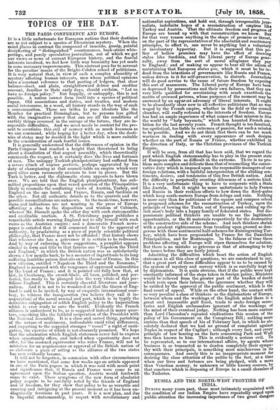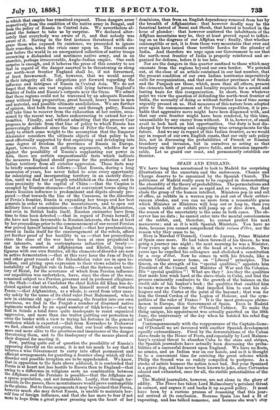RUSSIA AND THE NORTH-WEST FRONTIER OF INDIA. Drama many years
past, those most intimately acquainted with the condition of our -Indian Empire have repeatedly urged upon public attention the increasing importance of two great dangers to which that empire has remained exposed. These dangers arose respectively from the condition of the native army in Bengal, and from the policy of Russia in Central Asia. We nevertheless al- lowed the former to take us by surprise. We declared alter- nately that everybody was aware of it, and that nobody was aware of it. Having in the first ipstance threatened with dis- grace those who exposed its existence, we proceeded to ignore their remedies, when the crisis came upon us. The results are now before the world iu an unorganized collection of native troops overawing a disbanded and mutinous native army, and in an anarchic, perhaps irrecoverable, Anglo-Indian empire. One such surprise is enough, and it behoves the press of this country to see that in regard of the danger asserted to be threatening us along our north-west frontier England shall be, if not forearmed, at least forewarned. Not, however, that we would accept in their integrity all the allegations put forward regarding the influence and intrigues of Russia in Central Asia. We do not forget that there are vast regions still lying between England's frontier of India and Russia's outposts near the Oxus. We admit that these regions could not be traversed by an adequate Russian army without long preparation, great hazard, heavy losses in men and material, and possible ultimate annihilation. We are further of opinion, that both from necessity and through policy, Russia will take time to recover from the exhaustion at her centre, occa- sioned by the recent war, before endeavouring to extend her ex- tremities. Finally, and without admitting that the present Czar proposes to deviate from that line of policy to which Russia has perseveringly adhered since the time of Peter the Great, we are ready to attach some weight to the assumption that the Emperor Alexander considers the ultimate objects of that policy to be most effectually supported by first organizing and developing into some degree of freedom the provinces of Russia in Europe. Apart, however, from all partisan arguments, whether for or against the possibility of Russia's supplanting our power in Asia, there are certain unquestionable facts which indicate the measures England should pursue for the protection of her Indian territory from all exterior aggression. These facts may be briefly summarized as follows :—That Russia, during a long succession of years, has never failed to seize every opportunity for colonizing and incorporating territory in an easterly direc- tion, until we find her at length established on the Amoor, and in close proximity to the capital of China :—that the Caspian is occupied by Russian steamers—that at convenient towns along its shores Russian influence is predominant and &pits already pre- pared :—that towards the line of the Caucasus, in the direction of Persia's frontier, Russia is expending her troops and her best generals in order eo subdue the mountaineers, and to open out military lines of communication :—that in Persia, in Affghanistan, and even in British India itself, Russian emissaries have from time to time been detected :—that in regard of Persia herself, if she have not been favourable to Russian interests, she has at least by her proceedings prior to the commencement of our recent Persian war proved herself inimical to England :—that her proclamations, issued in India itself for the encouragement of the rebels, afford yet further proof of her hostility to us :—that her proceedings since the close of the war have been at once prejudicial to our interests, and in contemptuous infraction of treaty :- that in the countries of Affghanistan and Khelat, lying con- tiguous with our own frontier, all the elements of disorder are now in active fermentation :—that at this very hour the Jam of Beyla and other great vassals of the Beloochistan ruler are in open re- bellion, and giving open expression to their views relative to the instability of English rule in India :—that the fortress and terri- tory of Herat, for the severance of which from Persian influence our expedition was undertaken, have, since the close of the war, remained subject to a Persian governor and in professed allegiance to the Shah:—that at Candahar the chief Kohin dil Khan has de- clared against our interests, and has himself moved off towards Persia :—that Afghanistan, as a whole, is saved from utter anar- chy solely by the name of its chief ruler, Dost Mahommed, who is now in extreme old age :—that crossing the frontier into our own provinces, we find in the Punjab a number of disarmed native regiments watched by an equal number of Sikh levies :—that we find in Scinde a total force quite inadequate to resist organized aggression, and more than one traitor quitting our protection to cross the border with a view to trying his fortunes in the general confusion which is expected :—that from Kurrachee to Peshawur we find, almost without exception, that our local officers become more and more alive to the greatness and imminence of the danger threatening them, and to the inadequacy of the means placed at their disposal for meeting it.
Now, putting quite out of question the possibility of Russia's appearing directly on the scene, it is not too much to say that it behoves a wise Government to carry into effect permanent and efficient arrangements for guarding a frontier along which all this disorder andpossible irruption are to be apprehended. We know, that in opposition to the facts above adduced, it is contended that Persia is at heart not less hostile to Russia than to England—that owing to a difference in religious sects no combination between the Affghans and the Persians is possible--that the Affghans are a sparse population, and not formidable. Lastly, that though for- midable in the passes, these mountaineers would prove contemptible in the plains. But to these arguments it may be rejoined that Persia, however much she may detest Russia, is unable to maintain her- self free of foreign influence, and that she has more to fear if not More to hope from a great power pressing upon the heart of her
dominions, than from an English dependency removed from her by the breadth of Affghanistan: that however deadly may be the fanatical hatred of Sooni and Sheah, that hatred is hushed in the hour of plunder : that however scattered the inhabitants of the Affghan mountains may be, they at least proved equal to inflict- ing on us the disgrace of our Affghan war ; finally, that whether contemptible or not, it is from these very mountains that over and over again have issued those terrible hordes for the plunder of India. And therefore we urge upon our Government to see that the north-west frontier of India is properly reinforced and or- ganized for defence, before it is too late.
Nor are the dangers in this quarter confined to those which may emanate from the regions beyond our own border. We pointed out, at the close of an article contained in our last number, that the present condition of our own Indian territories imperatively calls for reorganization, and that our frontier provinces of Scinde and the Punjaub are those, which, more than all others, present the elements both of person and locality requisite for a sound and lasting basis for this reorganization. In short, from whatever point we view the question of defending the north-west frontier of India, the necessity of doing so without further loss of time seems urgently pressed on us. Had measures of this nature been adopted prior to the commencement of the Persian expedition, it is pro- bable that aggressive move might have been dispensed with, and that our own frontier might have been rendered, by this time, unassailable by any enemy from without. It is, however, of small avail to look back on lost opportunities. Our duty is best dis- charged by forewarning and suggesting wise arrangements for the future. And we say in regard of this Indian frontier, as we would say in respect of our own English coasts, that our only safe policy lies, not in discussing the probabilities of French or Russian treachery and invasion, but in ourselves so acting as that treachery on their part shall prove futile, and invasion impracti- cable. Let us guard our coast, and permanently establish our frontier.



























 Previous page
Previous page